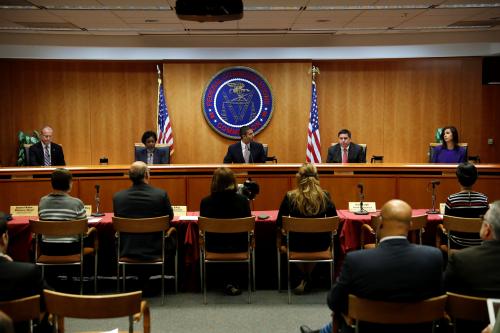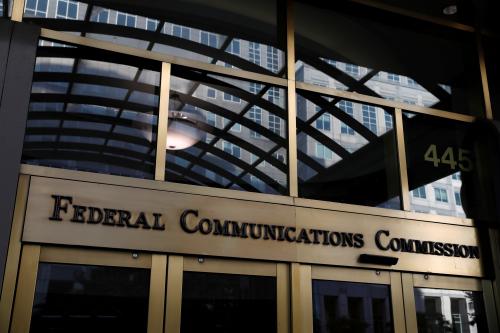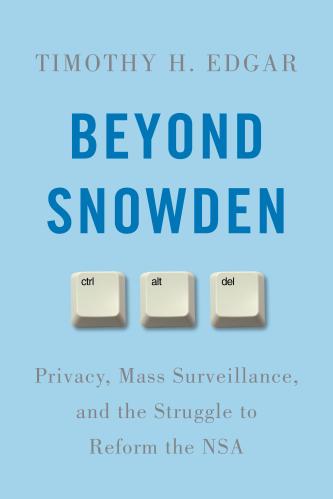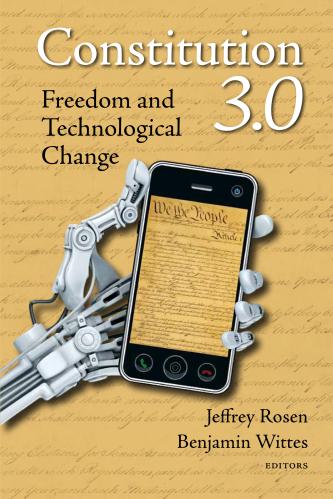Given our current political divisions, it is not surprising to see federalism debates in the middle of many arguments over technology policy. Advocates are arguing over who should set the rules of the road concerning municipal broadband, privacy, cell tower siting, and drone regulation, among other issues. Should there be national rules that govern new technologies or should states and localities have the power to make the relevant decisions?
When I was growing up in the 1960s, states’ rights arguments were associated with segregationists resisting the power of the federal government to impinge on local prerogatives regarding race. A generation of Southern white leaders fought federal orders to desegregate local schools on grounds that states and localities should control education and be allowed to send children of different races to separate schools. Federal officials disagreed with that logic and argued there were constitutional provisions related to civil rights that warranted national sovereignty in order to promote voting rights, discrimination bans, and integrated schools. Following Brown v Board of Education and other landmark rulings, the latter argument triumphed and national officials exercised their power to enforce civil rights protections in education, housing, employment, voting, and other areas.
Now with President Donald Trump in the White House, a Republican-controlled Senate, and major cities dominated by progressive leaders, the political equation has flipped. Local progressive leaders, especially on the East and West Coasts, are resisting national immigration policies, establishing sanctuary cities, developing their own climate change rules, banning facial recognition software in law enforcement, and placing restrictions on the use of various digital technologies.
The federalism angle on new technologies
In 2015, the Federal Communications Commission ruled on the side of federal preemption of state rules when it overturned provisions of Tennessee and North Carolina laws prohibiting local communities (such as Chattanooga and Wilson) from expanding “community-owned broadband networks”. The argument was that large broadband providers had lobbied state legislatures for restrictive rules as a way to limit competition, and that new state laws were detrimental to city-based innovation. As noted at the time by then FCC Chairman Tom Wheeler, “communities should be able to determine their own paths to meet their constituents’ needs,” and be able to build their own broadband networks with public dollars.
Ultimately, though, that viewpoint lost in the 6th Circuit Court of Appeals in 2016. Judges there ruled “Congress never specifically authorized the FCC to preempt state laws” and invalidated the Commission’s decision. It was not the role of the federal government to establish a uniform policy on municipal broadband, according to this ruling.
Today, people are continuing to fight jurisdictional battles over who has the authority to regulate various kinds of technology policies. Preemption has emerged as a major issue in national privacy legislation, for example. Following a California decision to enact a tough privacy bill, industry advocates have proposed a national bill that would preempt state laws and create a national privacy policy. But critics of that approach worry that the national standard would be significantly weaker than the California provisions.
In 2018, the FCC made a declaratory ruling that restricted the fees state and local governments could charge for 5G wireless infrastructure. Led by Chairman Ajit Pai, the majority on the Commission argued there could be fees “no greater than a reasonable approximation of objectively reasonable costs for processing applications and for managing deployments in the rights-of-way.” The decision also established 60, 90, and 150-day deadlines by which localities must make authorization decisions for small cell tower construction and other wireless infrastructures.
Federalism issues are also playing a role in decisions regarding drone regulation. The Federal Aviation Authority regulates the airspace for unmanned aircraft systems. Its guidance for local governments says the FAA has responsibility for aviation operations, safety, noise abatement, navigation, and traffic control. But increasingly, states and localities are talking about enacting their own rules on privacy, flying beyond line of sight, airport and water supply protections, voyeurism, harassment, flying while intoxicated, drone weaponization, harming livestock, and reckless endangerment, among other provisions.
The interstate commerce clause
Cutting through many of these cases are disagreements regarding the interstate commerce clause of the U.S. Constitution. Some experts are arguing that digital services by their very nature represent interstate commerce and therefore are best dealt with by Congress. In order to avoid the fragmentation of state-centered markets, it is necessary to have uniform standards, not state or local statutes.
Bret Swanson of the American Enterprise Institute is sympathetic to this viewpoint. He argues that in a digital world, we should resist the urge to regulate the internet or digital services at the state or local levels. “Today’s mobile devices go everywhere. Data, services, and apps are hosted in the cloud at multiple locations and serve end users who could be anywhere – likewise for peer-to-peer applications, which connect individual users who are mobile. Along most parameters, it makes no sense to govern the internet locally. Can you image 50 different laws governing digital privacy or net neutrality? It would be confusing at best, but more likely debilitating,” he argues.
Taken to its logical conclusion, that perspective could be used to invalidate state or local rules on digital technologies. It could be employed to strike down the California privacy bill, restrict drone safety and privacy provisions, prevent localities from establishing rules on cell tower siting, limit local AI regulation, and invalidate city bans on facial recognition software.
Given the current composition of the U.S. Supreme Court, a majority of justices could endorse that interpretation of the interstate commerce clause and sharply limits the ability of state and local governments to impose rules on digital services or technology innovation. As noted by David Fidler of the Council on Foreign Relations, Chief Justice John Roberts now is the swing vote on technology policy. He very well could be the one who decides the parameters of American federalism in regard to digital policy. That should worry consumer rights organizations and local progressives who are fighting to restrict unfair or discriminatory practices.
Of course, if 2020 becomes a successful Democratic year, the political equation may shift again. Progressive Democrats will want to pass new national rules on a variety of digital policies, while Republicans would revert to their traditional stance favoring states rights and local control. In looking at current Democratic proposals, there likely would be efforts to protect privacy, stimulate competition, break up large technology companies, and require unbiased AI applications. However that election turns out, federalism debates will continue to play a prominent role in digital policy discussions.










Commentary
Why national preemption has become a technology policy flash point
July 18, 2019